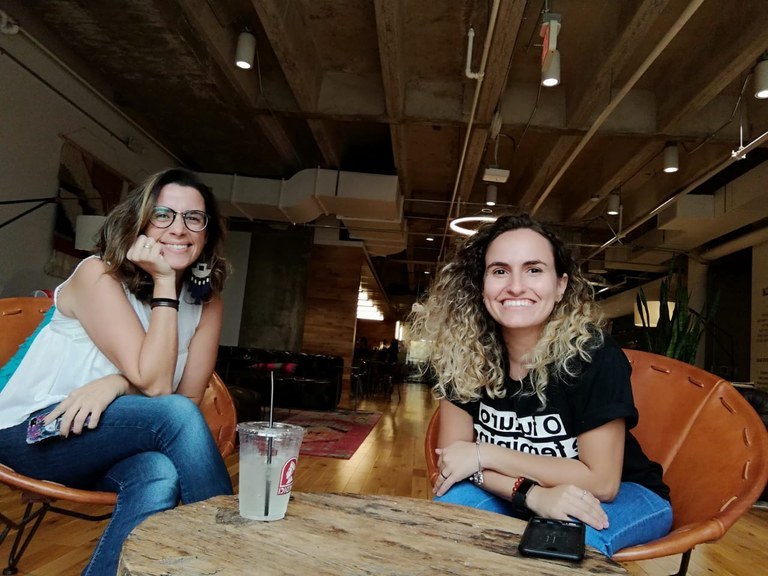Notícias
Business
Women occupy market in technology-based businesses

Maria Clara Magalhães e Marcela Fujiy na sede da Be. Labs. Arquivo pessoal.
Márcia Dementshuk
Her very existence is a disruption: she is a student of Electrical Engineering, she is northeastern, she is an entrepreneur in the field of technology, she is a woman. Through Maria Clara Magalhães's profile, it is possible to understand why it is difficult for women to pursue a professional career in the exact sciences - especially in technological development.
Maria Clara Magalhães is 23 years old, is from Alagoas, studies in Campina Grande and is a co-founder partner of Be.labs - accelerator for startups in Paraíba that will complete two years in May - with Marcela Fujiy, Christian Fujiy.
A Crunchbase.News report, suggested by the entrepreneur, reveals that 20% of start-ups recently funded in 2019 have a female founder. If the figure seems low, given that 80% are led by men, the same Crunchbase Diversity Report for 2019 indicates that the proportion of women present has doubled since 2009 - it was 10%. In Paraíba, the numbers of the Centelha Paraíba Program - supporting early stage startups - indicate that women's participation is higher: 28% of the 540 ideas submitted came from women.
For Maria Clara, "if we want to create a diverse, inclusive future, we must discuss the technologies, the gender impact. In April she will travel to the United States and represent the Northeast at MIT, discussing technologies, gender, and how to make change happen.
The month in which women celebrate one day, March 8, begins today. And in this interview Maria Clara shows that every day a victory is achieved. She talks about the positioning of women in the market, the barriers and the disruption in this picture.
Q - Why restrict Be.Labs' market of operation to the Brazilian Northeast?
We chose to have an outreach in the Northeast because we understand that there is a greater stigma in this region, and it is left aside. We've already had speedboats from São Paulo, but the band here plays differently. It's a harder job, but it's our understanding of what we must do.
Q - What is the difference between the Southeast and Northeast startups?
The Southeast is much more enlightened about the mindset, while here we need to formulate, to build the thought; it is a work of ants, of pre-acceleration. It is not one of acceleration as the startups business advocates. We had to take a step back in order to develop these women who have a vision of enterprise but lack the business feeling.
Q - What is missing for women to enter the field of technology?
In our vision of the top of the technology workforce most senior positions are filled by white men. It's hard to think that we [women] can get there by mirroring ourselves in people different from our reality. I study in the Electrical Engineering course at UFCG; I have about 60 teachers and four are women. It's normal for students to look and think: how am I going to get there if no woman has ever gotten there? That creates a gap between technology students.
Q - In your opinion, why don't women venture into the exact sciences?
Even those who venture out like me, who work in the area, are bombarded all the time by people saying that we don't know how to do it, that we can't, that we won't be able to develop because we are women. When we occupy the spaces we must be very, very strong to face the prejudice that exists - moral, sexual harassment?
Q- What is the profile of these women who face the challenge and take up space in the market?
The people who meet the challenge are not alone. Most of the women who are with us [on the accelerator] and who are willing to venture into the field of technology have the awareness of the collectivity. It's a beautiful thing: it's like we're walking in a gang. They are curious people who have this characteristic of confrontation, of persistence, of resilience because they believe and will develop because they know they can.
Q - What stigma does women face in this area?
If anyone now types "northeastern woman" in Google, they will get violence rates, which reflects this "plague bitch" culture. I did the CBT on this topic; interviews with random people in Arapiraca (PE), where I am now, at my parents' house, asking what she thinks about the "feminine. The answers were simple, for example: many told that they wanted to but could not get divorced because they suffered prejudice from society. Can you imagine undertaking and more, in the area of technology? To become a unicorn is a reality that is practically impossible for most women.
Women in Technology Meeting takes place March 28 in JP
“Mulher Tech Sim Senhor” is a large event of women of technology from Paraíba, organized by the Women Techmakers community, a worldwide Google program created to encourage women to work in technology.
According to data from the Association for Promotion of Brazilian Software Excellence (Softex), between 2007 and 2017, the number of women working in the IT sector were about 20% to 24%.
The meeting has been held in João Pessoa since 2016. Last year, more than 120 women from 12 cities attended. The main themes addressed will be technical contents of the programming areas, project management, artificial intelligence; and subjects such as diversity, labor market - sorority, that is - the union among women.
The Tech Sim Senhor Woman will be on March 28th, during the morning and afternoon at the Master Auditorium of UNIESP Central Block, in João Pessoa. Registrations are free.
Information by Instagram: @mulhertechsimsr.
Translated By Iohan Faustino

